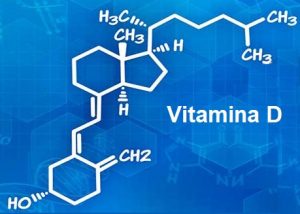(1,25 Vitamin d3, 25 OH vitamin d, vitamin d3, cholecalciferol, calsitriol)

Vitamin D occurs naturally in very few foods, is added to some foods, and is available as a dietary supplement. It is synthesized from the cholesterol molecule in the body as a result of a series of reactions with the contribution of sunlight (UVB). Therefore, it is important to be exposed to sunlight on a daily basis in order to reach normal levels.
Vitamin D originating from animal cholesterol is called cholecalciferol (cholecalciferol), and vitamin D originating from vegetable cholesterol is called ergocalciferol.
Vitamin D exists in the blood in two forms. One of them is total vitamin D (25 OH vitamin D), most of it is bound to vitamin D binding protein and is thus carried in the blood. The other active vitamin d3 (1,25-dihydroxy vitamin D3) is the kidney activated form. This form has a short lifespan in the blood.
Vitamins are substances that the body needs for normal growth and development in general. The best clarified effect of vitamin D is its effects on bone and calcium metabolism. It provides the absorption of calcium, one of the main building blocks of bone tissue. The form that provides its effects is the activated 1,25-(OH)2-d3 (1,25-dihydroxyvitamin D) form.
Foods rich in vitamin D (d3) include egg yolks, saltwater fish, and liver. It can be taken in the form of ready-made preparations in case of ingestion with these and similar foods and in case of deficiency despite the synthesis in the body. It is very important to measure the blood level (d3 analysis, vitamin d3 test) in the laboratory before taking it as an external support. Because vitamin D is one of the rare vitamins that can cause toxicity.
Vitamin D deficiency can cause bone diseases such as osteoporosis or rickets. It also has important roles in many systems in the body, such as the nervous, muscular, and immune systems. For this reason, it has been one of the most researched molecules in the medical world in recent years. As a result of the researches, it is thought that d3 can provide protection against diseases such as cancer, type 1 diabetes and multiple sclerosis.
People who need to take regular external vitamin D (25 OH D, 25-hydroxyvitamin D) supplements;
- Seniors
- Breastfed babies
- People with dark skin
- People with certain conditions such as liver diseases, cystic fibrosis and Crohn’s disease
- People who have had gastric bypass surgery
Vitamin D (1,25-(OH)2 D) has a multiple role in the body;
- Maintaining bone and dental health
- Supporting the health of the immune system, brain and nervous system
- Regulating insulin levels and helping with diabetes management.
- Supporting lung function and cardiovascular health.
- Effective on the expression of genes that play a role in cancer development.
According to recent studies, a significant portion of the world’s population is thought to be vitamin D deficient. Although regular exposure to the sun for 15-20 minutes daily ensures sufficient vitamin D production, the reason for this deficiency is the rapid breakdown of vitamin D. Warehouses cannot provide adequate support, especially during periods when there is not enough exposure to sunlight, such as in winter.
Recommended daily intake of vitamin D;
- Baby (0-12 months): 400 IU d3
- Child (1-18 years): 600 IU d3
- Adult : 600 IU d3
For the synthesis of vitamin D in the body, the skin must be in direct contact with sunlight. Sunscreens reduce vitamin D synthesis. A factor 30 protection cream can reduce vitamin D synthesis by up to 95%.
Symptoms that may occur in vitamin D deficiency;
- Frequent illness and infection
- Fatigue
- Back and bone pains
- Depression
- impaired wound healing
- Hair loss
- Muscle pain
Reference values accepted for vitamin D test;
- Normal value > 30 ng/mL
- vitamin D deficiency; 20-30 ng/mL
- Vitamin D deficiency; small 20 ng/mL
is accepted as
A tube of blood taken from the arm is sufficient for a vitamin D test. Unless there is a mandatory condition, blood is drawn after 10-12 hours of fasting. While the vitamin D test is being researched, it is seen that it is searched on the internet with quite different writing formats.
These formats are as follows;
- vitamin d3 assay
- Vitamin d3 assay
- d3 analysis
- d3 analysis
- vitamin d3 test
- vitamin d test
- Vitamin d3 test
- d3 blood test
- d 3 test
- d-3 test
- 1,25 Vitamin d3 test
- 125 vitamin d3 test
- 125 vitamin d test
- 1 25 vitamin d test
- 1 25 vitamin d3 test
- vitamin d3
- vitamin d
- Vitamin d3
- d31,25 Vitamin d3
- 125 vitamins d3
- 125 vitamins d
- 1 25 vitamin d
- 1 25 vitamins d3
- vitamin d 25 oh cholecalciferol
- cholecalciferol
- cholecalciferol
- cholecalciferol
- cholecalciferol
- 25 OH vitamin d
- 1 25 oh vitamin d
- 25-hydroxyvitamin D
- 25-OHD
- 1,25-dihydroxyvitamin D
- 1,25-(OH)2D
- DHVD
- 25-OH-VITAMIN D
- CALCIDIOL
- 1,25-(OH)2 VITAMIN D
- CALCITRIOL
- vitamin d 3 test
- vitamin d-3 test